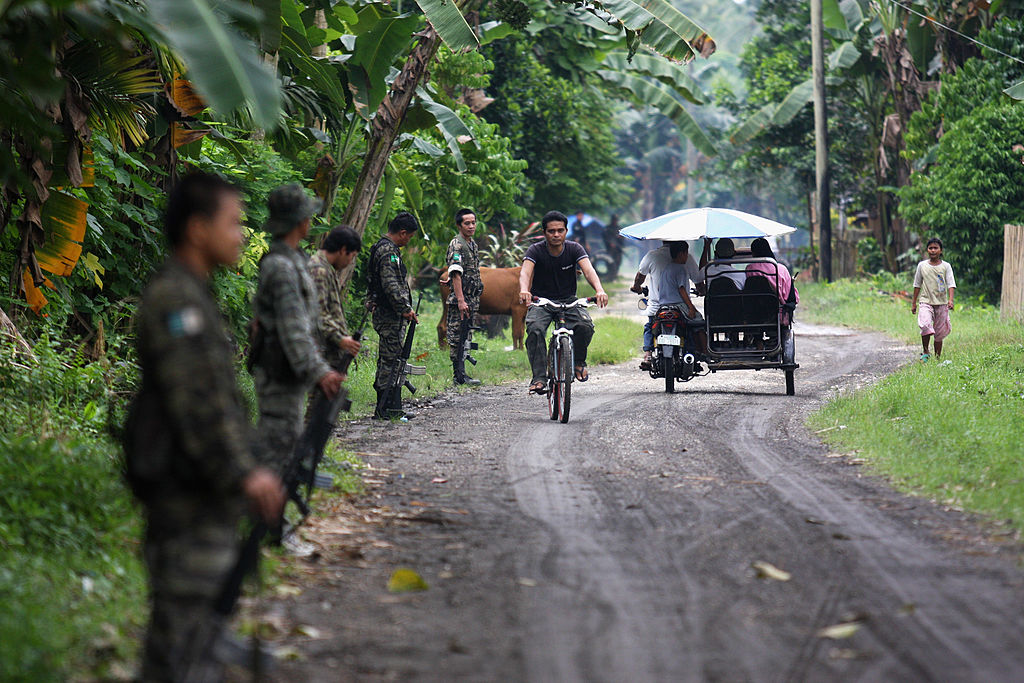
When you consider the complexity of the Moro Islamic insurgency in the southern Philippines and the diverse motivations of the groups involved, it’s all too easy to be pessimistic about the prospects for a peaceful resolution to the 50-year conflict. The Islamic State–affiliated Abu Sayyaf Group, the Bangsamoro Islamic Freedom Fighters (BIFF), the Maute Group and the New People’s Army all appear more interested in mayhem than in peace.
Despite the best efforts of these spoilers, peace and indeed cooperation between the Philippine national government and the Moro Islamic Liberation Front (MILF) are flourishing.
In July last year, Philippine President Rodrigo Duterte signed the Bangsamoro Organic Law, which allowed for the establishment of the Bangsamoro Autonomous Region in Muslim Mindanao (BARMM). The BARMM is composed of municipalities on Mindanao’s west coast and also encompasses the islands of Basilan, Sulu and Tawi-Tawi in the Sulu and Celebes Seas. Its creation represents a major step towards a political solution to the long-running conflict in Mindanao.
Since the establishment of the BARMM, peace has broken out between the Philippine government and the MILF. Everywhere you look in the regional capital, Cotabato City, someone is building something. In the field, the MILF, aided by close air support from the Armed Forces of the Philippines (AFP), is pursuing terrorist groups.
The success to date is causally linked to the multi-track approach being used to manage the security situation in the BARMM.
At the political level, the national government has established the BARMM Transition Authority, which is made up of members nominated by the government and the MILF. This has fostered greater cooperation and coordination between the MILF, the AFP and the Philippine National Police (PNP).
At the same time, Duterte has pushed his ministers and the civil service to assist in normalising peace arrangements in the BARMM, including by making progressive changes in the way the security agencies function.
The AFP, while still maintaining a very visible presence, has removed itself from policing the community, despite the existence of martial law. It has shifted its efforts to maintaining continuous pressure on Abu Sayyaf, the New People’s Army and BIFF by ‘finding, fixing and finishing’ them. By relentlessly pursuing these groups, the AFP has denied them the opportunity to reorganise and plan attacks.
In response to the AFP’s change in strategy, the PNP has taken on a more security-focused role. Through physical presence the PNP has sought to discourage conflict and restrict the terrorist groups’ freedom of movement.
Under the umbrella of the BARMM regional government, the MILF, AFP and PNP have established 30-strong joint peace and security teams comprising seven AFP, eight PNP and 15 MILF officers.
These arrangements have been critical for facilitating the peace process and in dealing with the parallel conflicts present in the BARMM. But after decades of conflict, policing in the BARMM remains militarised to a degree, which has left a gap in law enforcement in the community at large.
While the threat environment still demands that a large portion of the BARMM security sector focus on fighting terrorism, success in meeting that challenge is generating new community policing requirements. For the normalisation process to continue, communities need to have faith that the BARMM and the Philippine government can deliver peace and security.
For that to occur, the PNP needs to deal with the regular conflicts between Moro family clans, the presence of private armed groups, and an alarming gun culture present across the BARMM. But they also need to build the Moro people’s confidence in their ability to enforce the law and resolve disputes.
In the wake of the Marawi siege, the international community focused on providing assistance to the Philippine government to enhance the counterterrorism capabilities of the PNP and AFP. These actions should be commended as they were critical to both organisations’ ongoing and successful campaigns against Abu Sayyaf, the New People’s Army and BIFF. But at this critical juncture in the peace and normalisation process, new police capacity development requirements are emerging.
To full appreciate these requirements, the BARMM, the PNP and the national government will need to work with Mindanao communities to identify and resolve issues of law and order.
The primary focus of this work needs to be enhancing public confidence in those institutions. The development and implementation of community-based policing methodologies that concentrate on conflict resolution and problem solving will be key to building trust.
This community-policing approach will generate a requirement to enhance the negotiation and conflict-resolution skills of PNP officers in the BARMM. These skills will be critical to resolving the ongoing clan disputes that plague the region.
There’s an opportunity here for Australia to play an active role in reforming the security sector in the BARMM and in doing so to make a lasting contribution to the normalisation process.
Australia’s law enforcement agencies, especially its state and territory police forces, have hard-earned experience in community policing, and their current models are underpinned by an extensive evidence base.
Similarly, the Australian Federal Police International Deployment Group’s experience in Solomon Islands, Timor-Leste and Cyprus could be used to develop negotiation and conflict-resolution training for the PNP.
As this new chapter of the peace process in the southern Philippines continues to evolve, Australia needs to reconsider the nature of its assistance to the BARMM and move beyond its existing role of counterterrorism support.
[John Coyne is the head of the North and Australia’s Security program and the Strategic Policing and Law Enforcement program at ASPI.]
https://www.aspistrategist.org.au/australian-policing-skills-can-help-build-peace-in-the-southern-philippines/

No comments:
Post a Comment
Note: Only a member of this blog may post a comment.